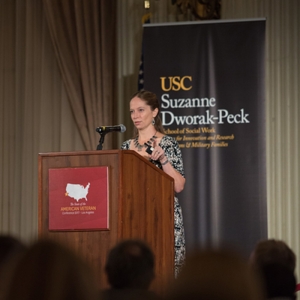USC conference tackles issues facing today's veterans
October 13, 2017 / by Claudia Bustamante- Research
Every year, hundreds of bills go through the California Legislature that deal with veterans or military issues, including most recently to establish residency for in-state tuition, identify veteran status in coroner’s reports, and increase funding for veteran resource centers on college campuses.
But Sen. Josh Newman, who chairs the state’s committee on veterans affairs, said it’s not enough.
“I often worry that we’re just shaving around the edges of the problem, and we’re missing the core,” Newman said at a recent event held to address the most-pressing issues facing today’s veterans. “And the core is the need to fundamentally address the transition process—how veterans leave the military and come back into their communities.”
More than 300 leaders from across the country recently convened to suggest ways to improve transition at the State of the American Veteran Conference, an event held Sept. 28-29 in downtown Los Angeles by the USC Center for Innovation and Research on Veterans & Military Families.
Among the recommendations developed were educating the community on military culture and trauma, improving how veterans earn credit for college and career opportunities, expanding mental health services to members of the Guard and Reserve units, prioritizing access and affordability of childcare, and actively including families in the transition process.
Carl Castro, the center’s director, said the progress made by attendees over two days was impressive, but solving the most-pressing challenges facing veterans and their families will take more time.
“It’s a process. A single meeting brings people together to talk about issues we need to address,” he said. “We need to keep meeting, keep discussing and keep collaborating. There’s a lot of work that still needs to be done.”
The conference focused on the unique experiences facing different populations of veterans, including those with combat experience, those pursing higher education, Guard and Reserve service members, and military families.
One track focused on women, who make up about 10 percent of the total veteran population and whose ranks will continue to grow over the years. Kayla Williams, director of the U.S. Department of Veterans Affairs Center for Women Veterans, gave a keynote speech at the conference and urged everyone—regardless of gender—to care about issues facing women veterans.
She encouraged the attendees to do what they could in their daily lives for women, including ensuring that women’s voices are heard at events like the conference that focus on the future of veterans.
“We are among the fastest-growing segments of the veteran population. Initiatives to serve veterans must focus on serving all of them, which includes women, people of color, LGBTQ individuals, and those who range in age from under 20 to over 100,” she said.
Research-Driven
Every year, about 200,000 veterans leave the military, of which many will encounter challenges transitioning to civilian life.
Housed within the USC Suzanne Dworak-Peck School of Social Work, the center led the first comprehensive needs assessment of the veteran community in Los Angeles, followed by similar studies in Orange County, Chicago and San Francisco.
Though the results are unique to each location, emerging trends pointed to issues facing all veterans when accessing care and local support. Mainly, veterans are unprepared for civilian life and the communities that take them in are also unprepared to handle their multiple needs.
Attendees received an overview of what current research has found on each group’s transition experiences. They also learned about gaps in services and programs from experts in the field. These preliminary discussions were used to develop policy and practice recommendations.
We Are A Tribe
At the end of the conference, Chase Millsap, MPP ’16, told attendees to keep the momentum going.
“It’s going to be easy to go back to the daily grind. I beg you, fight that urge,” said Millsap, who now oversees impact strategy at We Are The Mighty, a media and production company for the military and veteran community.
“Everyone here depends on each other. We are a tribe and tribes collaborate. They have to to survive the war and they have to to thrive at home.”
The conference was sponsored by The Boeing Company, Cohen Veterans Network, Deloitte LLP, USC Suzanne Dworak-Peck School of Social Work, USC Alumni Veterans Network, USC Marshall Master of Business for Veterans, Unite US, Aetna, Brainfuse, Grant Thornton, MPOWR, ZipRecruiter, Lima Charlie News, and by individuals, including Corazza-Bogenreif, Judith & Elliott Wolfe Family Trusts, USC Professor Kathleen Ell and her husband, Lawrence, and Dwight Tate.
To reference the work of our faculty online, we ask that you directly quote their work where possible and attribute it to "FACULTY NAME, a professor in the USC Suzanne Dworak-Peck School of Social Work” (LINK: https://dworakpeck.usc.edu)
